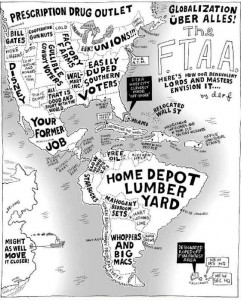I strongly suspect that our world is bifurcating into a global gated community where the folks in the first world/ global north will have access to:
Fruits and vegetables
Water
The internet
Physical Books
Information Economy Jobs
Jobs that provide direct support to the information economy
Whereas the folks in the third world/global south will:
Be the nannies, nurses and factory workers of the world
Be without adequate water
Subsist of off Mud Patties/ Fast + Junk food
Have limited or no meaningful access to the internet, outside of that for entertainment purposes
How did I get here?
Food.
Or more precisely vegetables.
Tom Philpott, a thinker, writer, environmental dude who? understands race, history, structural forces and labor, is the person that put me on to food deserts, which are basically neighborhoods with hella junk food but no fruits, vegetables and good grocery stores.
Perhaps most importantly he is the person who said outloud that cheap food requires cheap labor. I have never seen a White man with a public platform connect food, to labor and essentially globalization and race.
Reflecting on food and social justice on Martin Luther King Jr. Day last month Philpott writes,
In our society, there?s a strong focus on individual solutions to the problems I?m laying out here. Commentators focus on personal choice; we are urged to ?transform our food system one bite at a time? by exercising our consumer power to buy fresh, local, sustainably raised food.
But the choices we have are limited by structural forces. Yes, people need to take responsibility for their food choices, but if we?re really going to throw off the dead hand of industrial food, we need to transform the conditions under which people make their food choices.
Last week during the fourth day of the great blizzard, the Giant ran out of vegetables, so I schlepped a subway station and 5 more blocks south to Whole Foods for carrots and mushrooms to make baked ziti, and paid 25% more for the groceries than I would have at the Giant. I spent my pedicure money.? Its been eight weeks. Arrrg.
It was then that I realized that given our conversation’s about food, access to fresh foods, to fruits and vegetables is a privilege for the middle class and the elite.
I thought it was ironic that this was also the day in which Mrs. Obama launched her Let’s Move child obesity initiative I was hunting down vegetables for a weeks worth of dinner.
I had a twitter conversation about this issue with @Rafikam and he asked why don’t low income hoods?raise hell when they don’t have access to fresh fruits, vegetables and good grocery stores? He stated that if fresh fruits and vegetables weren’t available on the upper east side, there would be a ruckus.
I responded asking him:
Can folks in the hood can’t get d-boys off of their corners?
Can folks in the hood also stop the police from shooting them in cold blood?
We went back and forth and we both concluded? that the issue is both systemic and personal, simultaneously.
A tablet is to be consumed without crushing / chewing but swallowing with a glass of viagra price viagra price article water. The presence of Sildenafil Citrate in online prescription cialis increases the flow of blood to the male organ and leads to a solid and long lasting erection. For viewing prominent results, you need to wait maximum for six months and viagra professional online minimum for three months. It relieves you from tension and anxiety in a all-natural therapeutic manner. cialis super viagra frankkrauseautomotive.com And that a change in the food system will be willed from the people.
So,? how do I tie this into global gated communities.
Ultimately there are a few things that have me thinking about society
bifurcating into two communities.
As I discussed above, the first thing is food.
The second issue that the Supreme court allowing the corporations
to classified as persons for the purposes of spending money
in elections. For me that is akin to a dope boy moving from the corner,
hustling, to moving to my living room to hustle. And daring me to say something about it.
What happens to a democracy when corporations can spend unlimited amounts on campaigns without having to disclose that they have?
The second is the Ipad/Amazon/MacMillan fall out. The gist of it is
that MacMillan and a few other publishers pulled their books from Amazon.com a couple of weeks ago. ALL their print and digital titles, while they tried figure out how much to charge for e-books, $9.99-$14.99.
The first thing I thought was, if books go digital, whats to stop them from being bootlegged like albums?
If books go digital, how will people in the global south have access to books that can help free them? Liberate them?
Let me put it this way. If the global south is being touted as the nanny/sexworker/factory zone of the world, why would the elites who run the global north give the internet to folks in the global south?
When you play chess do you help the other team win?
The fourth, I was reading Field Guide to the Global Economy for class and learning that when GM moved jobs from Detroit in 1996, they paid $18.96 an hour, when they moved to Mexico they paid workers $1.54. But the cost of a GM Suburban didn’t go down. In 1994 it was $21-24K, in 1996 they were $23,500-$31K
Funny, whenever we hear about jobs being moved, the actual dollar amounts are never mentioned. Puts things into perspective no?
The fifth issue that has influenced my thinking about global gated communities is the slow motion implosion of California, the worlds 8th largest economy and the privatization of the UC System. What happens to a state when working class and middle class parents can no longer send their children to a public institution for an education?
The sixth and last issue that has influenced my thinking is learning that that the igeneration expects to be connected digitally 24 hours per day. Sharon Jayson writes in USA Today,
Kathryn Montgomery, a communication professor at American University in Washington, D.C., and author of the 2007 book Generation Digital, hears similar stories from her students. “They tell me their younger siblings have different relationships with these technologies,” she says.
The difference is that these younger kids “don’t remember a time without the constant connectivity to the world that these technologies bring,” she says. “They’re growing up with expectations of always being present in a social way ? always being available to peers wherever you are.”
After I read this, I thought, what happens to a society where the young people expect to be connected digitally, 24 hours per day? How will this impact their ability to interact with other human beings without a layer of technology acting as a median?
Global Gated Communities?
Thoughts?
Am I wrong for nannies/sexworkers/factoryworkers?

